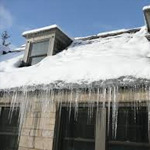 To prevent frozen pipes and broken water lines in the winter months, it is vital to take steps to prepare your plumbing system for the winter. Here are some common winter plumbing issues and what you can do to prevent serious problems for your home.
To prevent frozen pipes and broken water lines in the winter months, it is vital to take steps to prepare your plumbing system for the winter. Here are some common winter plumbing issues and what you can do to prevent serious problems for your home.
Leaks
A small leak might not seem like a big problem, but it can increase your water bill and causes concerns with flooding and mold. In the winter a simple leak can lead to freezing, which causes a pipe to burst. Detach the hoses from your home to prevent them from freezing and leading into your home. Always check for leaks throughout your home and repair them properly to prevent serious leaks and concerns with mold and flooding.
Insulate Pipes
Basement pipes are prone to freezing as the temperatures become colder. There is also a concern with freezing pipes on the exterior walls of the home. The best way to prevent freezing is by adding insulation to the pipes and to the exterior walls of the home to prevent freezing. Pipe foam insulation is easy to wrap around the basement pipes, and will reduce the risk of freezing and burst pipes.
Remove Hoses
Close all of the exterior bibs and detach the hoses to the home. This is an effective way to reduce the risk of freezing pipes as the water can become stuck in the hose and will lead up to the home. Detach the hoses and blow air into each hose to effectively remove excess water from the hose. Store the hoses in a shed or garage where they will be away from the harsh winter weather. If you live in an area where the temperatures stay well below freezing, cover the outdoor spigots. This will provide an extra layer of insulation to keep the pipes from freezing.
Winterize Sprinkler Systems
A sprinkler system needs to be properly winterized to prevent the pipes from freezing. Drain the water from the pipes and shut off the water main to prevent water from getting into the pipes. After shutting off the main, open the valves to release any water that is in the spigots.
Tune Up the Water Heater
Your water heater will work harder in the winter months due to the demands for warm water, and the colder temperatures. Take the time to tune up your water heater to prevent it from working too hard. Clean the water heater by draining it completely, refilling it halfway and draining it again. The draining process will remove excess sediment found in the water heater. The removal of sediment will make it easier for the water heater to heat the water. To keep the water warmer, wrap the water heater in insulation. Open the door to the room where the water heater is located to keep this room warm. This will prevent the water heater from working too hard. Use these tips to prepare your home for the cold winter months, and prevent serious issues from occurring.
Taking the necessary steps to properly prepare your home’s plumbing system for winter can help save you lots of trouble and headaches down the road. If anything goes wrong with your plumbing, make sure you are getting the best repair possible and contact the plumbing technicians at Tudi. At Tudi, our master plumbers know what it takes to keep your home’s plumbing running at maximum efficiency. Call us today and find out how you can save 15% on any plumbing repair with the Tudi Home Comfort Plan.







